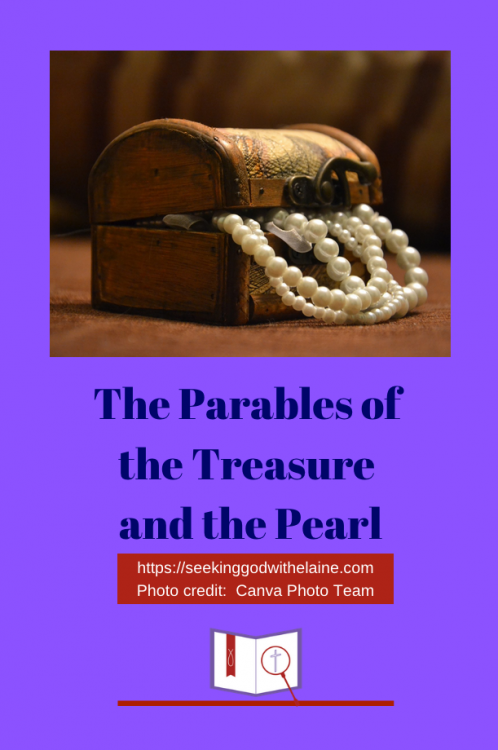Jesus told two parables of seeking a priceless item. This daily devotional looks at how disciples of Christ should value their salvation and the kingdom of God.
Nuggets
- We should consider Heaven to be as wonderful as buried treasure.
- We should consider Jesus’ sacrifice as a priceless gift to us.

In the last devotion, I came across a sentence that caught my eye. Boston wrote, “None can be let into a discovery of Christ in His glory, but must love Him (Matthew 13:44-46).” Salvation is only gained through loving Jesus.
Resource
I wanted to take a look at those verses in Matthew. They first example is just one sentence, so it might be harder for some to understand.
The second example is two sentences long, so it may get a little more fleshed out.
Let’s see what we see.
Finding Buried Treasure
“The kingdom of heaven is like treasure, buried in a field, that a man found and reburied. Then in his joy he goes and sells everything he has and buys that field” (Mt. 13: 44 CSB)
We should consider Heaven to be as wonderful as buried treasure.
Matthew 13: 44 is called the Parable of the Hidden Treasure. Where I live, we generally do not bury our treasure in the backyard or the field. Most do not have fields in which they could do that. Some don’t even have the backyard available.
However, back in Jesus’ day, war and oppression forced people to hide things of value. While they could be hidden within the walls of the house, they were most likely buried in fields or gardens.
Resource
The reason the man bought the field was, according to Jewish law, the treasure was only his if he could show ownership of the field and it’s grain. It wasn’t just finders keepers.
Resource
To some, Heaven could be a far off concept that is just kind of there. The purpose of this parable was to remind Jesus’ audience the value of Heaven.
Jesus gave the impression that the man just stumbled on the treasure. He wasn’t actively looking for it. Barker said we shouldn’t consider it was chance.
But finding it, the man realized its value. He gave up everything to possess the treasure.
To read a related devotion, click on the appropriate button below.
We are called to be disciples as we go along in our daily lives. Barker reminded us that God does not always explain the purpose of things. He wrote, “Nor is it often given to us to say why. It is for the blest man himself, however, to count it an example of free, unmerited, sovereign goodness and mercy.”
Resource
Good and bad things happen to us that we may not figure out the why of it. We just have to realize that God had some reason for that to be a part of our Sanctification Road. He will use it — good or bad — to change our character to be like His.
Part of me is saying, “Oh, no! We have to figure out who the past owners of the field were. When was the treasure buried and how? Why wasn’t it found before now? How much taxes are we going to have to pay in it?”
When I was younger and going through my braces period, I read something once in Reader’s Digest. Don’t look a gift horse in the mouth — of course, you should. It might need enough orthodontic work to bankrupt you.
Luckily, this is a gift, though it was hidden, was one that could be quickly accepted. The treasure was, according to the Essex Remembrancer, “… wisdom, grace, comfort, and joy.”
Resource
Wray had an interesting sermon. He talked about something not being of value until an expert verified that it was of value.
Resource
My mind immediately went to those shows where people will take in Uncle George’s whatchmacallit to have it appraised. He always said it was worth something, but they thought he didn’t know what he was talking about.
They were ready to be told it was worth $50. And it was valued at $5,000 or even higher.
Suddenly, it became valuable in their eyes because an expert said it was worth it.
I keep thinking that this describes the worldview people’s estimation of being a disciple of Christ. They don’t see it as valuable at all — when in fact, it is priceless.
Wray described the last test of value was the test of adaptation. Now some might try to read that as we can modify Scriptures to reflect our needs and beliefs.
We can’t. We have to, as Wray wrote, “… bring a thing nearer and magnify it …”
It is only as we are in more contact with Scriptures and bring it closer, that we magnify it and unlock its mysteries. It is then we can allow Scriptures to begin changing us.

Let’s face it. At times, Scriptures can be hard to understand. That is by design.
Paul wrote, “For since, in God’s wisdom, the world did not know God through wisdom, God was pleased to save those who believe through the foolishness of what is preached. For the Jews ask for signs and the Greeks seek wisdom, but we preach Christ crucified, a stumbling block to the Jews and foolishness to the Gentiles. Yet to those who are called, both Jews and Greeks, Christ is the power of God and the wisdom of God, because God’s foolishness is wiser than human wisdom, and God’s weakness is stronger than human strength” (I Cor. 1: 21-25 CSB).
We have to seek God in His Word and at His house. We have to bring it close to us so we can change our character to be like His.
Parsons argued, though, that the message was hidden from believers, not worldview people. It is applied to believers who do not value the gospel.
Resource
Hmmm. I wonder if Jesus here was describing those who are lukewarm in their faith (Rev. 3: 15-16).
The Biblical Illustrator interpreted the treasure to be Jesus. A different Biblical Illustrator sermon listed why Jesus as the treasure works.
- Jesus was hidden from men.
- Benefits of being a disciple of Christ is hidden.
- While many may be landowners, few own treasures or can even see the treasure.
- G od must reveal the treasure.
Resource
I can see that. We know Jesus used the parables about common things to instruct on spiritual things. Jesus wasn’t just gossiping about a lucky man. He was trying to expand God’s kingdom.
Finding a Priceless Pearl
“Again, the kingdom of heaven is like a merchant in search of fine pearls. When he found one priceless pearl, he went and sold everything he had and bought it” (Mt. 13: 45-46 CSB)
We should consider Jesus’ sacrifice as a priceless gift to us.
Matthew 13: 45-46 are called the Parable of the Priceless Pearl. In these days of established trade routes and reliable transportation, it may be difficult to remember the struggles merchants in Jesus’ day faced. Transport was dangerous because of the threat of robbery.
Winterbotham reminded us that there was no paper money along with no vehicles in which to haul the merchandise. He contended that merchants might use gems such as pearls that could be hidden on their person as an easy way to transport their profits back home.
Resource
It is easy to read these verses as the merchant automatically obtained the valued pearl. However, if we look carefully at verse 45, it says the merchant was going in search of fine pearls.
Jesus was stressing the journey down the Sanctification Road, not just obtaining the one priceless pearl. We must diligently seek God
Searching for and Seeking God
Hearing His Word (Rom. 10: 17).
Reading His Word (Rev. 1: 3).
Praying to Him (Heb. 4: 16).
Studying His Word (Ac. 17: 11).
Meditating on His Word (Ps. 1: 1-2).
Memorizing His Word (Ps. 119: 11).
When we buy into the Do and Don’t Theory — that disciples must always do the do’s and never do the don’ts — discipleship could become a chore. That isn’t what Jesus intended.
“Come to me, all you who are weary and burdened, and I will give you rest. Take my yoke upon you and learn from me, for I am gentle and humble in heart, and you will find rest for your souls. For my yoke is easy and my burden is light.” (Mt. 11: 28-30 NIV).
Adeney cautioned that many see discipleship as a duty because they “… never hope to see in it any attractions or to make it an object of eager desire.”
Resource
The merchant, too, went and sold everything he had in order to purchase the priceless pearl.
If Jesus is the treasure, Eaton said that salvation is the pearl. It came at a great price – the sacrifice of our Lord and Savior.
Resource
We can only gain salvation through genuinely loving Jesus. Yes, it is free to us, but it comes at a cost.
I was always wondering how best to explain that. I think Adeney did that for me. He wrote the following:
“The pearl is costly. The merchant must sell all he has acquired on his journey to buy this one pearl. Now, we know that the gospel is God’s free gift; it was costly, for it cost the life of Christ on the cross; therefore it is not a cheap gospel; yet it is not bought by us, but by Christ. These facts, however do not exclude the necessity of sacrifice on our part. We can pay nothing to God. But we must renounce sin and self, and the idolizing and trusting in all things but God.”
Resource
We are to give up the willful commission of all sin at conversion. It is logical that that would be considered the cost of salvation.
The Biblical Illustrator put it this way: “Selling all, signifies no more than parting with whatsoever his heart was inordinately set upon before he found this pearl.”
Resource
We read of missionaries selling all they own in order to go to the mission field. We hear of those who have lost everything in the pandemic.
Sometimes, God does ask us to give up worldly possessions. He always asks us to give up all sin.

Many of the sermons I read felt that the pearl represented Jesus. They described
- His value
- His perfection
- His unchangeableness
- His splendidness
Resources

Making the Connections
Did you notice that the parables talked of only one man each? Our relationship with God is an individual thing.
Yes, we need to be a part of a community of like-minded believers. But they can only encourage us. Our faith is ours alone.
That means we need to have a personal relationship with God.
Arnot pointed out that the parables represent experience. What the two men in the parables did was prioritize God.
Resource
How Do We Apply This?
- God calls us to salvation. It isn’t enough to find the treasure and view the priceless pearl. We must listen to the Holy Spirit.
- When He calls us, we need to make them our own. We need to respond with joy.
- We need to give up our sins and be willing to give up whatever He asks of us.
- We need to focus on Him.
Resource
When we accept the gift of salvation, we have received a priceless gift. We need to treasure it.
Father God. You are a treasure beyond measure and a priceless pearl. We search for You; and when we find You, we continue to seek for You. Give us the joy. Help us to diligently follow Your call. Amen.
The ABCDs of Salvation
If you have not become a believer in Christ, please read through the
Plan of Salvation and prayerfully consider what God is asking you to do.
A – admit our sins
B – believe His Son Jesus is our Redeemer
C – confess God as Sovereign Lord
D – demonstrate that commitment by making any changes needed in our lives to
live the way in which God has called us
The Disciple’s Job Description
What do you think?
Leave me a comment below (about this or anything else) or head over to my Facebook group for some interactive discussion.
If you don’t understand something and would like further clarification, please contact me.
If you have not signed up for the email daily or weekly providing the link to the devotions and the newsletter, do so below.
If God has used this devotion to speak with you, consider sharing it on social media.